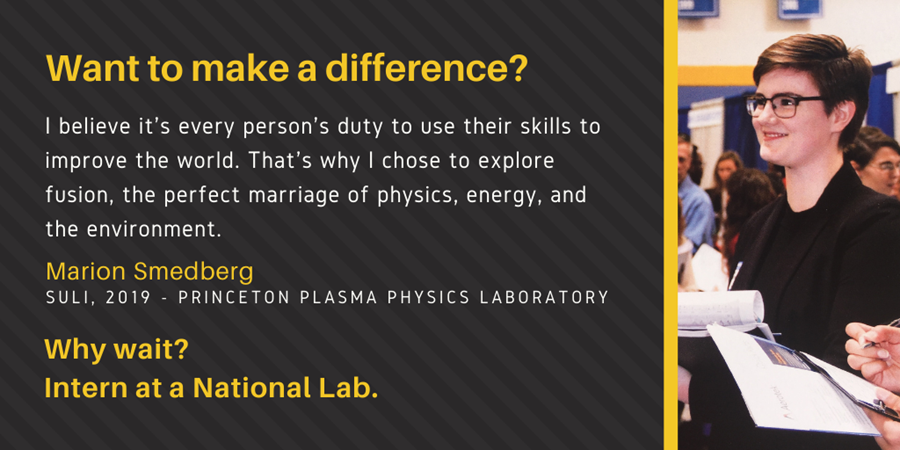Marion Smedberg
Former SULI Intern Researched Plasma and Fusion Sciences

Internship program: SULI
Term and year: Summer 2019
Undergraduate institution: Notre Dame of Maryland University
Major: Physics
Host DOE Laboratory: Princeton Plasma Physics Laboratory, Princeton, NJ
Mentor name: Andrew Zwicker
What was your research topic during your internship?
My project was training a neural network to classify NSTX edge data. T his meant I took images of the plasma edge, fed it into a big mess of algebra, and trained the equations to output the correct label. I was excited to be working with neural networks and machine learning, which sounded very cool and sci-fi. I still think these topics are cool, but they are less “sci-fi” to me now! The images of the plasma edge were very cool as well; they were actually slow-motion movies taken with a state-of-the-art Phantom high speed camera, hoping to understand edge dynamics of the device.
What was it like coming to a National Lab for your internship?
The university where I did my undergraduate degree was a tiny, all-women, liberal arts school in the middle of a city. PPPL, on the other hand, was incredibly technical, mostly male, and in a relatively rural area. Luckily, the other interns made it easier to feel like I belonged because many were female, or people of color, or also came from small liberal arts schools.
Describe a concern you had while considering or applying to the internship. What advice would you give to help a student with the same concern today?
Starting new things, I always tend to get overcome with the feeling that I don't know enough or that what's asked of me would be too much for me to handle. In those times I try to remind myself that things always seem the most insurmountable at the beginning. The point of an internship isn't to have all the knowledge and skills already at hand - the point is to have the curiosity and drive to build those skills as you go.
Think of a time you experienced success during your internship. What did this success look like?
A moment of success I can recall from the internship is when I gave my final presentation to a group of scientists from PPPL and elsewhere. Talk about nerve-wracking! The presentation went well though, and afterwards my second advisor said he was impressed by how much I had gotten done, considering the internship was only 10 weeks. I found it not only flattering, but helpful to have that "benchmark," if you will. W ith research, there's always so many more questions than answers, so it's hard to tell when what you have been able to do is enough.
Think of a time you experienced failure during your internship or academic career. How did you feel at the time? How did you deal with the failure and work past it?
My plan for the summer after my second year of undergrad had been to do an engineering internship. When the few applications I had done fell through, I felt like I had wasted an opportunity . In the end, I got a job as a camp counselor, which was a huge challenge and learning experience. I am glad I did it, as I learned things about myself and developed skills I wouldn't have in an academic setting.
Did you make any important personal connections during your internship?
I met one of my very best friends during the SULI internship, and I'm incredibly grateful for that. We made some incredible memories over the course of the summer, and we still talk every day even though we're an ocean apart now.
What are your values? How are your values expressed through your academic or professional career?
I believe it's every person's duty, and especially my duty, to try and find work that maximizes their unique skills to help improve the world. That's why I chose to explore fusion. I'd like to work in fusion or energy/electricity, trying to protect the environment. I'd love to get a job at a research center or national lab. I also hope to incorporate education and outreach into my future career, things I truly love to do.



